54-40 or Play Ball!: The International Match Games that Fueled Base Ball’s Grown in 1870s Cascadia
Happy Canada Day! Let’s celebrate with the first prominent base ball club in British Columbia! And learn how early baseball in the Northwest built community at home and across the border.
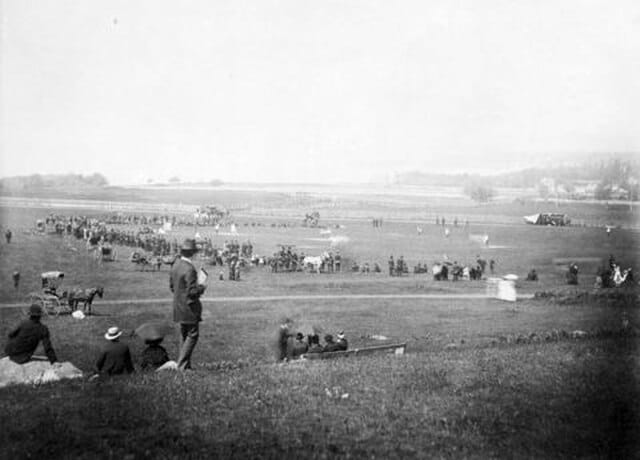
Before we head back to the 19th century, I recommend a stop early this century. A couple months ago I talked to Montanna Lovins, a staff writer for the University of Washington Daily about the 2001 Mariners and what it was like to experience that season. If you’d like to indulge in some good Mariners vibes (and why wouldn't you?!), it’s a fun read: 2001: A Baseball Odyssey.
Now, welcome back to the 19th century! I began diving into the century because I wanted a solid background on the growth and evolution of the baseball scene in Seattle. I could have started with the first team in Seattle, but it was immediately clear that there was a fascinating baseball history in the cities and towns that get much less baseball attention.
Last time, we learned about the Pioneer Base Ball Club of Portland, the first base ball club to form in the Northwest region of the United States:
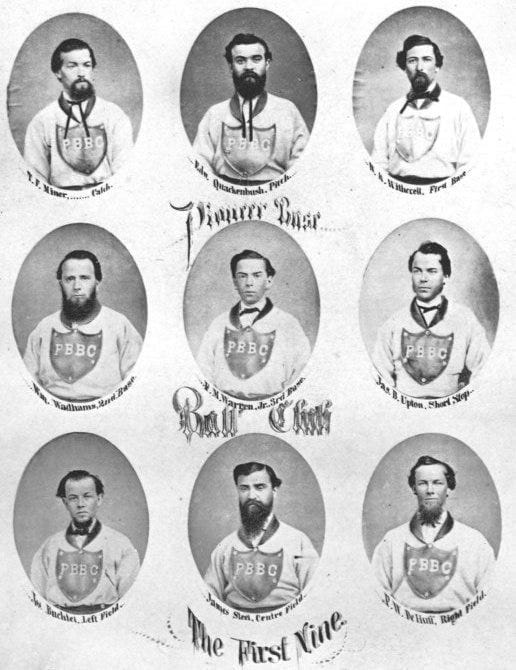
Getting into 19th century baseball is equal parts fascinating and frustrating because the documentation is so spotty. It’s entirely reliant on newspapers covering the games and clubs. In some cases there are blurry photographs or diary entries and stories passed down. But the only real verification of the games is in the newspapers. Some newspapers are preserved perfectly. Others have been lost to time; entire issues disappearing before they had a chance to be archived, others not deemed worthy of digitizing. Others waiting patiently for their turn. Then, there’s the accessibility of reaching what exists.
Every statement on these early games is hedged between “believed to be”s and “first known”s. For a sports that strives to document every pitch thrown, it’s like trying to understand an ancient civilization. That’s a lot of the fun too, the chance to find an obscure note in a little-known newspaper. The easter eggs sprinkled in the pages between the advertisements and goings-on of the towns.
Something that’s unique to the Northwest is that baseball has been played here nearly as long as settlers have been here. The towns and cities were founded and established at most 20-25 years before baseball was likewise established. It would be easy to take this and put together a purely American propaganda story of manifest destiny and the American pastime. But I see something else in the intermittent newspaper stories and the clubs that formed and folded over the early years of settlement.
In some ways it’s fair to say that history is in fact written by the victors. After all, we’re skirting right over the removal of indigenous populations from the Northwest. But history is written from filtering what is preserved and what is recorded through the prism of the present. It makes me laugh when people talk about the way history will remember this or that. We cannot possibly know.
This story about baseball in British Columbia and Washington Territory feels different in 2025 than it would have in 2000. It’ll feel different still in another 25 years.
Today, I see a story of wanting to belong, of wanting to build things that are good and lasting, and of building community and friendship with our neighbors by playing the game that captured imaginations across borders.
For all the crowing about baseball as a uniquely American sport, Canada has an early baseball history that, in some cases, began earlier than it did in the United States.
The Canadian Baseball Hall of Fame claims that the earliest recorded game in North America was played on June 4, 1838 in Beachville, Ontario. You’ll note this took a place a full year before the fictional story of Abner Doubleday “inventing” baseball in a cow pasture in upstate New York.
We can also say that, based on newspaper evidence, baseball began in British Columbia before it did in the US portion of the Pacific Northwest, although it did have American roots.
The city of Victoria, named for the British monarch, was settled beginning in 1843 and the crown colony was established in 1849. In 1858, word reached San Francisco that gold was being mined on the mainland and Victoria became a supply port. Many of the people who came north in pursuit of gold settled in Victoria, dramatically increasing the city’s population.
The Daily British Colonist first mentions baseball on March 16, 1863. It informs readers that the first match of the season was played on Beacon Hill the previous Saturday “chiefly by Canadians” and goes on to describe the game:
It is essentially an American game, but was introduced into Canada, and has been practised there in various parts of the country for many years. It is somewhat allied in its nature to Cricket, with the exception that there are no wickets used, and instead of the ball being thrown on the ground, it is directed towards to batter, who strikes it in the air. The runs are made by the person striking the ball and running round a circle, there being several stopping places, each of which counts. If the batter strikes at the ball and misses it, he is “out,” but he may let the ball pass him as often as he pleases without striking at it.1
On March 25, 1863, another match game is mentioned in the Daily British Colonist. This story takes a swipe at the debate over the origins of baseball, writing “Base ball is not an original American game, being only a slight variation from the old English ‘rounders’."2
This game story also included team and player names. The winning team is, unfortunately, impossible to make out. The team, name reading “H (illegible space) cbuck”, scored 39 runs. The other team, scoring 33 runs, is listed as “Fashion.”
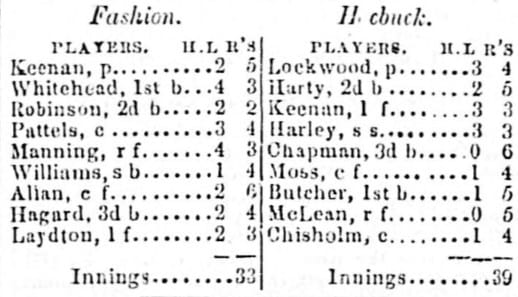
The Fashion Club was run by John C. Keenan. Keenan was born in 1831 in Ireland. He likely left Ireland during the Great Famine and arrived in Mexico in 1848, where he joined the Texas Rangers. He followed his Rangers commander Jack Hays to California when gold was discovered in 1849. Keenan settled in Sacramento, where he married a fellow Irish immigrant. In Sacramento, he opened the Fashion Saloon in the wake of a fire that destroyed the city. His saloon was so successful he opened another Fashion Saloon, where he and his wife may or may not have been operating a brothel.3
When gold was discovered in mainland British Columbia, he joined the rush and moved to Victoria. He had returned to Sacramento by the 1860 census, having adopted three indigenous children. (I don’t have the details around that situation, but you can be sure I’m side eying this.) He returned to Victoria soon after and opened another branch of his Fashion business, this time calling it the Fashion Hotel. It was on Yates Street, the main street in Victoria.
He didn’t just bring a legally dubious hotel and saloon business to Victoria, he also brought baseball. A number of secondary sources credit him as the “Father of Victoria Baseball”. The game story from March 25 mentions that players on both teams “improved during the game, owning to the instruction afforded to the less skillful by Mr. J. C. Keenan.4 ” Keenan also pitched for the team in a number of games.
Early baseball in Victoria wasn’t all fun and games, however. Later that March, this item ran in the paper:
ROW ON BEACON HILL.—A breach of the peace took place on Beacon Hill yesterday. Two men seated in a buggy, and driving around the hill, came in contact with a party who were engaged in playing base ball, and after some altercation, one of the base ball players pulled one of the men out of the vehicle, and as we are informed, presented a pistol at him. Some of the by-standers prevented any further violence occurring, and quelled the disturbance.5
A handful of other match games were reported that year. Base ball clubs often played cricket clubs at both base ball and cricket. It’s unclear how close the rules of the base ball matches followed the established New York rules. They may not have been following them to the letter because the following year, in March 1864, a newspaper announced that “a number of gentlemen of this city are about to organize a base ball club, according to the rules adopted by the American Congress of base ball players recently held in New York.”6
It’s unclear whether that team ever formed and played, but matches continued and the next big moment in Victoria baseball history came on August 1866 when the Olympic Base Ball Club of Victoria was officially formed and officers were elected.
Along with the Pioneers of Portland, the Olympics were one of the longest-lasting of the early club, and among the first to organize competitive match games.
The Victorians likely borrowed the Olympic name from the Olympic Ball Club of Philadelphia, by then a club famous for town ball that picked up the New York rules in 1860. The club had been around playing one form or another of bat-and-ball games since the 1830s. If the Victorians were looking to establish their club with the New York rules, the name certainly conveyed that they meant business.
The Olympics of Victoria played their first game as a club, splitting into two nines a week and a half after forming. After a couple club games, they took on the Victoria Cricketers in several matches. Although they were playing base ball and not cricket, the cricketers soundly defeated them each time.
But with practice, the Olympics got better and became the class of the baseball scene in Victoria. They were ready for a new opponent.
Walla Walla Statesman, Walla Walla, W.T., August 16, 1867
BASE BALL CLUB.—Our young men have caught the contagion and already have organized a base ball club, with the promise of a second one before the end of the week. The formation of two clubs will beget a spirit of emulation, and in the rivalry we may look for excellent playing. Walla Walla now takes her place on list of towns patronizing the great national game of base ball.
Walla Walla Statesman, Walla Walla, W.T., September 13, 1867
MATCH GAME OF BASE BALL.—The match game between the Excelsior and Walla Walla Base Ball Clubs, was played on Saturday, the ?, and resulted in a victory for the Excelsiors. At the conclusion of the playing the game stood Excelsiors, 85; Walla Wallas, 60. The Excelsiors were the challenging party, and as a matter of course feel somewhat elated over their success. The Walla Wallas propose to play them another game on Saturday, the 21st, when they hope to turn the tables.
Walla Walla Statesman, Walla Walla, W.T., September 27, 1867
BASE BALL.—The second of the match game of base ball between the Excelsiors and Walla Wallas was played on Saturday last, and resulted in a victory for the former. The Excelsior Club will take the premium bat.
The first Europeans reached the native Steh’Chass land that would become Olympia in 1792. The land was claimed by settlers in 1846 and officially established in 1850. It was named Olympia because of the view it offered of the Olympic Mountains. In November 1853, Washington Territory was separated from Oregon Territory and Olympia was named the capital. At the time, the territory had fewer than 4,000 settlers, and just under 1,000 in Olympia’s Thurston County.
Even with a small population, Olympia soon had baseball.
The first known club was the Rainier Base Ball Club. There isn’t much known about the club, and newspaper coverage was sparse. But they were known enough by 1969 for The British Colonist to remark in May 1869 that the Rainiers were a “crack club” (this was a compliment!) and had “won several well-contested matches on their own ground."7
Whatever the beginnings of the club, the Olympic Base Ball Club issued a formal challenge for a match game to be played in Victoria on May 25, 1869.
The Rainier Base Ball Club journeyed from Olympia to Victoria for a three-day stay. They arrived in the neighboring capital the morning of the 24th, a day in which Victoria held a big celebration of Queen Victoria’s birthday, with “a large number of visitors from Puget Sound…to take part in the celebration."8 They were to remain in town until noon on the 26th.
The game took place at Beacon Hill, which remains a spectacular park to this day. It was, apparently, not named after the hill in Boston, but rather after the navigation beacons placed on the hill. The area was officially designated for use as a park in 1858, although Victoria residents had been using it for cricket matches, horse racing, and other recreation before.9
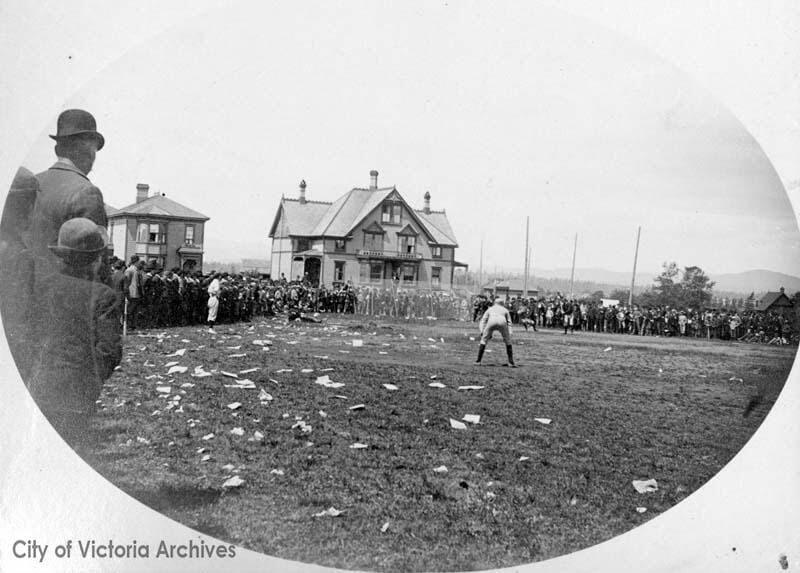
The match between the Olympics and the Rainiers began at 10 a.m. I didn’t come across much description of the game, but the Daily Colonist notes that the teams “presented a fine appearance—The Olympics wearing white flannel shirts and pants and white caps, with blue trimmings, and the initial letter “O” on the breast. The Rainiers wore white shirts and dark pants.” The match ended at “1 1/2 o’clock p.m.” The visiting Rainiers sored 23 runs and the Olympics put 45 runners across the plate and secured the victory. As we saw with the Pioneers, visiting teams were regaled after matches with dinner parties. It was no different in Canada. That evening, the Rainiers were wined and dined by the Olympics at the Oriental.10
With that, the historical entries for the Rainier Base Ball Club of Olympia end. The club bears the distinction of being the first known team to bear a name that remains treasured in northwest baseball history.
The Weekly Message, Port Townsend, W.T., June 23, 1869:
BASE BALL.—The bon ton of Port Townsend, are about organizing a base ball club, they have been in practice about two months and we understand from a very good authority that they intend to send a challenge to the San Francisco, B. B. C. And pay their expenses to play the game at this place.
(I was unable to find any evidence that this ever happened.)
Like most base ball clubs at the time, the Olympic Base Ball Club was founded by prominent businessmen in Victoria. The first president, elected when the club first formed in 1866, was James Gillon, the manager of the Bank of British North America. I wasn’t able to track down much more information about Gillon; suffice to say that running a bank automatically catapults a person to the top of society.
The secretary was E.A. McQuade, short for Edward Augustine. He was the son of Peter McQuade, an Irish immigrant. The McQuade family appears to have immigrated to Albany, New York prior to the Great Famine. From there, they moved to San Francisco for a few years in the mid-1850s and were part of the gold rush crew that left for Victoria in 1858. In Victoria, Peter opened a ship chandlery, P. McQuade & Sons. It doesn’t appear that E.A. ever took on a role in the chandlery, however. His brother Louis is often listed in rememberances of old Victoria, and often as Peter’s only son, which makes me wonder if there was a family falling out. Regardless, younger brother Louis would also play the role of secretary for a later iteration of the Olympic Base Ball Club.
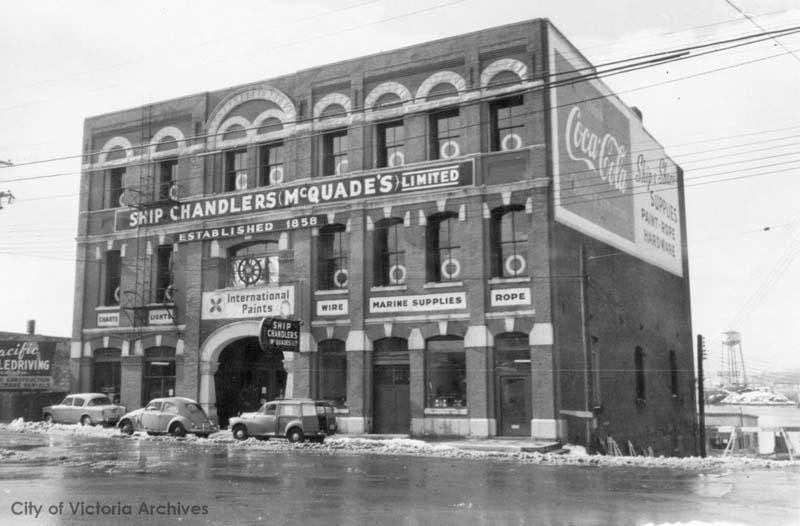
One of the Olympics directors was one of the most prominent men, in baseball and business, in early Victoria. Joshua Davies arrived in Victoria via a path that will be familiar by now. His parents were born in England and moved to Australia where Joshua was born, the oldest of several children. In the early 1850s the family made their way to California and settled in Sacramento. When the fire burned the city, the family lost everything and went on to San Francisco where Joshua graduated from high school. In 1864 the family moved again to Victoria.
There his father, Judah, opened a land auctioneer business, which Joshua took over upon Judah’s death. Judah and Joshua both were members of a number of fraternal societies, including the Free Masons and Odd Fellows, and Joshua later served as the director of the Royal Jubilee Hospital. He and his family were also prominent members of Victoria’s Jewish community and helped form that community.
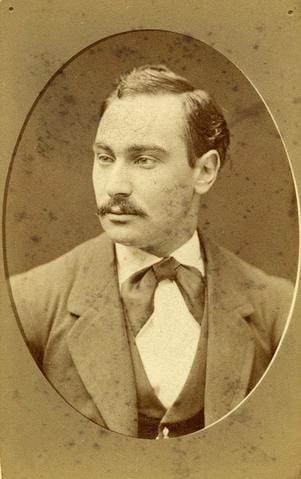
Among the influx of new settlers during the gold rush were members of the Jewish merchant class of San Francisco and California. Rather than seeking riches in the gold fields, they set up businesses in Victoria to participate in the new economy. Because it wasn’t an immigration from Europe, there was no overriding Jewish tradition to unite everyone. By all accounts, it seems that the Jews in Victoria didn’t experience the discrimination they did elsewhere, but they were still needed a religious community.
The Davies family were among the supporters who worked to build Congregation Emanu-El. The building was complete in 1863, and is still in use. In fact, it is the oldest continuously used house of worship in Canada and the oldest synagogue building on the west coast of North America. The synagogue opened in time for the High Holidays in 1863, as base ball was taking hold in Victoria.
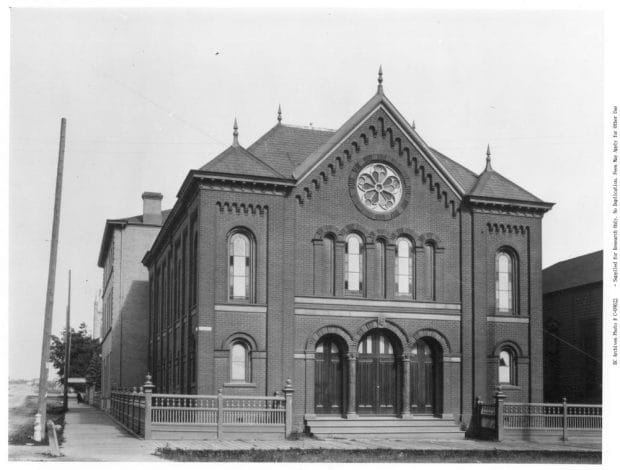
Joshua Davies was working at his father’s business and was a pillar of the Victorian business society, a member of fraternal societies, and an important part of the Jewish community. It may have seemed like he was up to his eyeballs in community involvement, but early Victoria was all about community involvement. Naturally, he also became involved in baseball, and would remain an important figure in Victorian baseball for years to come.
It’s unclear if the Olympics played during the 1870 season, but they were active in 1871, electing Davies president. The club got a late start in 1872. The club again elected Davies as president and E.A. McQuade stayed on as a director. They were formed just in time to accept a challenge from a new base ball club formed in the capitol city to their south.
Puget Sound Weekly Argus, Port Townsend, W.T., May 18, 1871
BASE BALL.—On Saturday last the Red Rover B. B. Club challenged the old Union B. B. Club to play a game of base ball; the challenge was accepted. The Red Rovers (school boys)…The Union club comprised several gentleman of the town. The score of the Red Rovers at the close of the game was fifty-nine runs, against sixty-eight by the Unions. The play of the Red Rovers was generally good, their fielding especially. It was only in the batting that the Unions beat them. Pull up, boys; you made the big’uns sore, if you didn’t beat them—there’s some gratification in that.
In June 1871, the Alki Base Ball Club formed in Olympia. The Olympia newspapers carried notices of their practices and indicated they would play games against Port Townsend and Victoria, but I didn’t run across any games in the newspapers.
Alki was an appropriate name for a team in the capital of the territory. It’s from Chinook Wawa, which was a trading language developed so the native people and traders could communicate in a mix of Chinook and English.11 The term ‘alki’ means later, in a little while, soon, etc.12 It was included on the seal of Washington Territory and is the unofficial (it was never ratified by the legislature) state motto.13
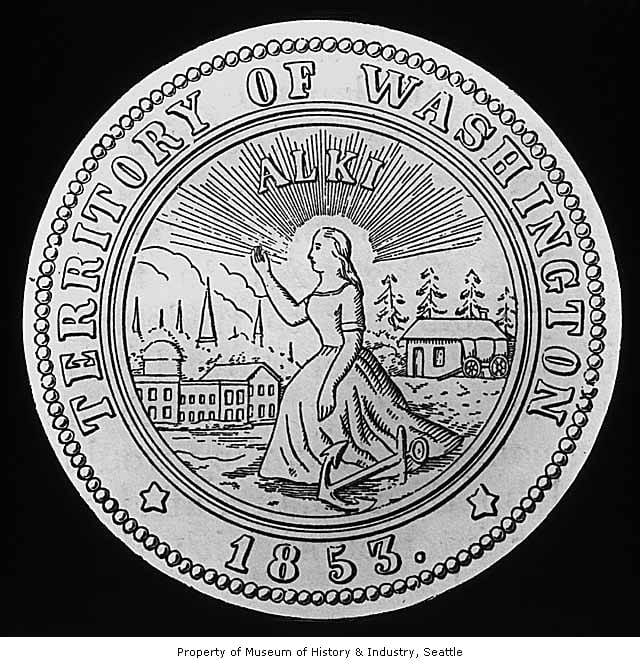
Challenges were exchanged between Olympia and Victoria and in order to accept, it appears that the Alki Base Ball Club either ceased to exist, or opted to officially organize as the Washington Base Ball Club in June 1872. Arrangements were made for the Olympic Baseball Club of Victoria to travel to Olympia and face the newly organized club on the Fourth of July.
To prepare, the Washington Base Ball Club began “performing morning and evening in anticipation” of the match.14 The Ball Club put on a soirée to raise money for the upcoming visit from the Victorians so they could adequately host. They also needed to find a place to play the game that could hold a number of spectators, for the match game was a pretty big deal in Olympia.
They quickly picked Chambers Prairie. In modern day Lacey, the site was near the house of Jacob Smith, one of Olympia’s famous early citizens. Like many who found themselves in the northwest, the Smith family arrived via the Oregon Trail. Smith and his wife Priscilla built a house on their land on Chamber’s Prairie in 1859 and raised 7 children, wheat, and sheep. Many years hence they would become great-grandparents to Bing Crosby. (Their oldest daughter married into the prominent Crosby family of Tumwater.) The home was the site of many social gatherings and the Smiths loved being at the center of their community.15 As such, it was the perfect location to host an international match game.
The Weekly Pacific Tribune offered a preview of the match as it approached:
From what we hear we should judge the two Clubs much more equally matched than were those of three years ago, on the occasion of the last match game. The Victorians are practising, becoming daily more formidable, and if the Olympians do not suffer a second defeat, they will have to play a remarkably good game."16
The Washingtons picked the best nine players from their entire roster of club members. Among those chosen were the father and son team of 36-year-old Lewis A. Treen and his 15 year old son, Frank, likely the oldest and youngest members of the team. It was a great opportunity for Frank to learn the game, and he would go on to play a role in Seattle’s first competitive team a few years hence.
At noon on July 2, 1872 the Olympic Base Ball Club of Victoria boarded the North Pacific along with a large number of other passengers and set sail for Olympia. The next day, at 11 o’clock a.m. the teams were loaded into wagons and driven out to Chambers Prairie.
There isn’t much detail available about the game, but we know the Washingtons avenged the loss the Rainiers suffered in Victoria by a score of 57 to 28. The Victoria Daily Standard received a message from Olympia with the result of the game. However, having had so much faith in the Olympics, the paper printed that “the correctness of the report is doubted.”17
Since the Olympics were already in Olympia, they challenged the Washingtons to another match game to take place a few days later on July 6. Again the teams drove out to Chambers Prairie, and again, the home team won. This time the score was 33-16.
The Victoria Daily Standard wasn’t happy to hear about the second defeat, writing, “ Our Victoria Nine must go to quarantine where every chance would no doubt be give them for practice.”18 In Olympia, the Washington Standard was feeling a bit snarky, when it joked, “A party of old men have challenged the defeated Victoria base Ball club to a match game."19
But the Weekly Pacific Tribune saw no hostility between the teams or the spectators, writing:
As on the previous occasion, large numbers of people witnessed the playing, and five wagon loads of people from town arrived on the ground just as the game ended. Playing commenced a little after two o’clock and continued two hours and twenty minutes. Both Clubs were in their respective uniforms, and every one played manfully, doing his very best. To and from the grounds the two Clubs rode in the same wagon, and on every occasion the most amicable feelings were displayed by the members of each club towards the members of the other.20
A nice souvenir from the second match game, is a box score:
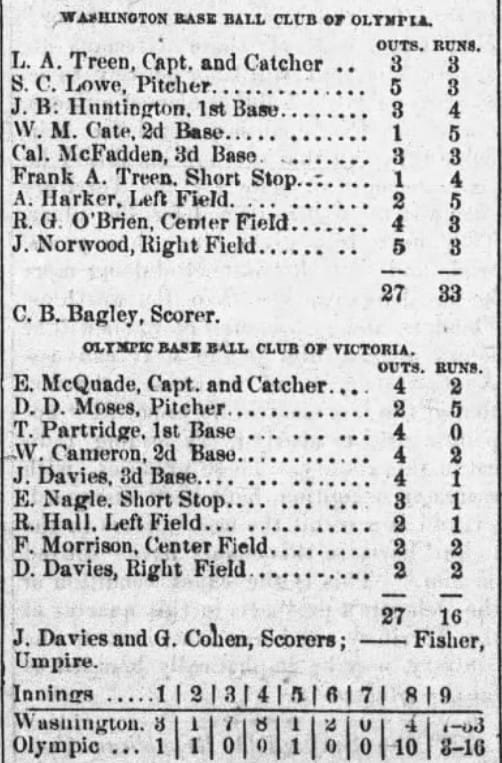
Puget Sound Dispatch, Seattle, W.T., July 11, 1872
BASE BALL-The “Dolly Varden” Base Ball Club of Seattle has organized by the election of the following officers; President, W.G. Jamieson; Vice President, Geo. D. Short; Secretary Edw. H. Brown; Treasurer, E. McD. Johnstone; Directors Chas. Moore, R. Bonney and C.F. Edmunds; Captain Chas. Moore.
The Washington Standard, Olympia, W.T., July 20, 1872
It is rumored that the Seattle Base Ball Club intend to challenge the Washington Club, of this place, to play a match game.
(Sadly, this never happened. There is no evidence that the Dolly Vardens ever played a single game.)
The Washingtons made a return visit to Victoria in September of 1872, again besting their Canadian cousins. Although both clubs reorganized in 1873 and 1874, there don’t appear to have been any further matches between the rivals.
But international match games were far from finished. Base ball continued to spread and grow, and more teams were popping up every season. Further matches between British Columbia and Washington Territory were just a few years down the line.
Puget Sound Dispatch, Seattle, W.T., May 1, 1873
BASE BALL.- At a meeting Thursday evening April 24th, of the Skookani Base Ball Club, the following officers were elected for the coming year: President Jos. F. McNaught; Vice President, F. M. Warren; Secretary, Edw. H. Brown; Treasuer, O.S. Warren; Directors, Chas Moore, E.S. Osborn and E. H Brown.
Any one desirous of joining the Club is requested to hand his name immediately to the Secretary.
Before we part today and head back to life in the year 2025, I want to draw your attention to a line in the box score of the match game between the Washingtons and the Olympics on July 6th. It reads, “C.B. Bagley, Scorer.”
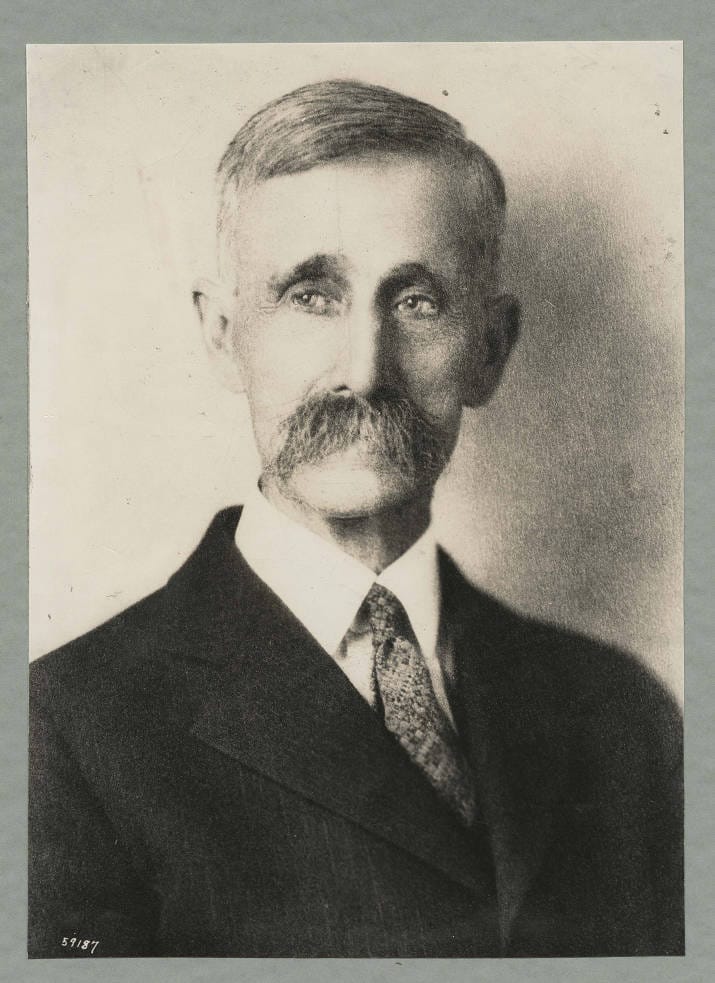
If you know even the slightest about the early Puget Sound settlements, particularly Seattle, you are likely familiar with that name or his work. Clarence Bagley arrived on the west coast with his family via the Oregon Trail. After a stop in Salem, OR the Bagleys become the 20th family to settle in Seattle.
Bagley went back east to attend Allegheny College in Pennsylvania. Bagley returned to Seattle and after a couple years got a job at the Pacific Tribune and learned the printing trade. There, he realized he felt a calling to document the early history of the settlers in Seattle and the wider Puget Sound region. He moved between Olympia and Seattle over the years, gathering information on the pioneers and settlers in the region, and put together invaluable documentary evidence of this early history. He “believed that in this way only could true accounts be written. He did not wish to see the state’s history portrayed through imagination nor did he wish it ‘to be manufactured by successors’."21
In 1872, he was back in Olympia, collecting as many newspapers, periodicals, reports, and records as he could, carefully guarding everything that came into his possession. He would go on to write several volumes of history, all of which remain invaluable resources for anyone searching for the roots of the region.
He clearly saw something worth preserving in base ball.
History is sometimes written by the victors. It’s written by people in the present who come into the past with their own biases and expectations. Whoever writes it, they can only write it with the evidence that’s preserved.
History is also written by the people who sit down to write it. It’s written by people who believe that in the distant present, we still need the community of the people who came before us. Maybe, for all the evolution we’ve done as humans, for all the ways we recognize the past wasn’t serene and ideal, we can find the pieces that give us hope. We can look at these people in the past and even use their examples here in the present.
Weekly Pacific Tribune, Tacoma, W.T., August 14, 1874
At a meeting held by the young men of New Tacoma, in Smith’s Hall, on Saturday evening, Aug. 8th, a Base Ball Club was organized, to be known as the “Tacoma Invincibles.”
Weekly Pacific Tribune, Tacoma, W.T., August 21, 1874
The match game of base ball for the honor of first nine came off yesterday afternoon in New Tacoma, with result as stated below. Considerable interest was manifested, both by participants and visitors, and all had a very good time.
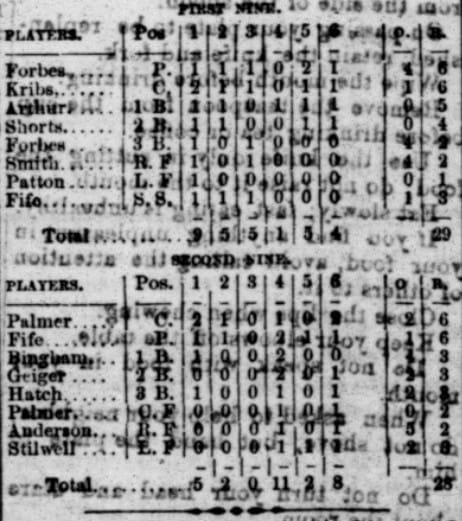
And the game of base ball marched on.
Other Links and Information:
I read through a ton of information to put this together, and in addition to the footnotes below, here are some websites I referenced. There is such a deep history here, it was hard to not keep breaking this off into smaller and smaller chunks to explore it. I was particularly interested in the building of the Jewish community in Victoria and the ways it wrapped around the building of baseball.
Victoria:
The Jewish Museum & Archives of BC: On These Shores Exhibit (includes a great early history before settlers and the very early settlers)
Jewish Victoria: A Historical Perspective
Jewish Cemetery of Victoria, British Columbia
Victoria Illustrated (has a section on Joshua Davies)
Temple Lodge Biography of Joshua Davies
Some Reminiscences of Old Victoria
Victoria's Latest Wing at a Ball Team
Protoball: Olympics Club of Victoria
Olympia:
Early History of Thurston County, Washington
Olympia Historical Society & Bigelow House Museum
The Story of the Mercer Expeditions (involves L.A. Treen)
Protoball: Rainier Base Ball Club of Olympia
Protoball: Washington Base Ball Club of Olympia
Footnotes:
- "Base Ball." The Daily British Colonist, Victoria, V.I., March 16, 1863, p 3. Accessed via Internet Archive: https://archive.org/details/dailycolonist18630316uvic/page/n2/mode/1up?q="base+ball"
- "Base Ball." The Daily British Colonist, Victoria, V.I., March 25, 1863, p 3. Accessed via Internet Archive: https://archive.org/details/dailycolonist18630325uvic/mode/2up?q="base+ball"
- Sullivan, Jack. "John Keenan Hit Big in Two Cities." Those Pre-Pro Whiskey Men!, Blogspot: https://pre-prowhiskeymen.blogspot.com/2020/09/john-keenan-hit-big-in-two-cities.html
- "Base Ball." The Daily British Colonist, Victoria, V.I., March 25, 1863, p 3. Accessed via Internet Archive: https://archive.org/details/dailycolonist18630325uvic/page/n1/mode/2up?q="base+ball"
- "Row on Beacon Hill." The Daily British Colonist, Victoria, V.I., March 30, 1863, p 3. Accessed via Internet Archive: https://archive.org/details/dailycolonist18630330uvic/page/n2/mode/1up?view=theater&q="base+ball"
- "Base Ball." Victoria Daily Chronicle, Victoria, V.I., March 20, 1864, p. 3. Access via Newspapers.com: https://www.newspapers.com/image/774939115/?match=1&terms="base ball"
- "The International Base Ball Game." The Daily British Colonist, Victoria, V.I., May 12, 1869, p 3. Accessed via Internet Archive: https://archive.org/details/dailycolonist18690512uvic/page/n2/mode/1up?view=theater
- The Daily British Colonist, Victoria, V.I., May 17, 1869, p 3. Accessed via Internet Archive: https://archive.org/details/dailycolonist18690517uvic/page/n1/mode/1up?view=theater&q="base+ball"
- Victoria Heritage Foundation: https://victoriaheritagefoundation.ca/HReg/JamesB/Cook100.html
- "Olympic vs. Rainier." The Daily British Colonist, Victoria, V.I., May 26, 1869, p 3. Accessed via Internet Archive: https://archive.org/details/dailycolonist18690526uvic/page/n2/mode/1up?view=theater
- Cascadia Bioregion: https://cascadiabioregion.org/chinook-wawa
- Cascadia Bioregion: https://cascadiabioregion.org/department-of-bioregion/your-chinook-wawa-word-of-the-day-alki
- Washington's "Evergreen State" nickname is likewise unofficial
- The Washington Standard, Olympia, W. T., June 8, 1872, p 2. Accessed via newspapers.com: https://www.newspapers.com/image/1135706355/?terms=base ball&match=1
- Experience Olympia, Jacob Smith House: https://www.experienceolympia.com/directory/jacob-smith-house/
- "Base Ball." The Weekly Pacific Tribune, Olympia, W.T., June 22, 1872, p 3. Accessed via the Washington State Library: https://washingtondigitalnewspapers.org/?a=d&d=WKLYPCTB18720622.2.22&srpos=9&e=------187-en-20-WKLYPCTB-1-byDA-txt-txIN-"base+ball"----—--
- "The Base Ball Match." The Victoria Daily Standard, Victoria, V.I., July 4, 1872, p 3. Accessed via newspapers.com: https://www.newspapers.com/image/775380937/?terms="base ball"
- "International Base Ball." The Victoria Daily Standard, Victoria, V.I., July 8, 1872, p 3. Accessed via newspapers.com: https://www.newspapers.com/image/775380964/?terms="base ball"&match=1
- "Base ball." Washington Standard, Olympia, W.T., July 13, 1872, p 2. Accessed via newspapers.com: https://www.newspapers.com/image/1135706397/?terms="base ball"&match=1
- "Second Match Game." The Weekly Pacific Tribune, Olympia, W.T., July 13, 1872, p 3. Accessed via the Washington State Library: https://washingtondigitalnewspapers.org/?a=d&d=WKLYPCTB18720713.2.28&srpos=13&e=------187-en-20-WKLYPCTB-1-byDA-txt-txIN-"base+ball"----—--
- Neergaard, Christine A. "Clarence B. Bagley: A Brief Biography." The Washington Historical Quarterly, Vol. 26, No. 2 (Apr., 1935), pp. 109-118. Accessed through JSTOR: https://www.jstor.org/stable/40475729

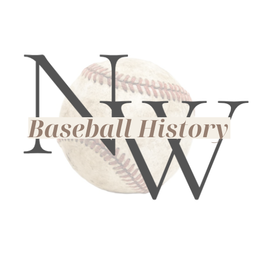
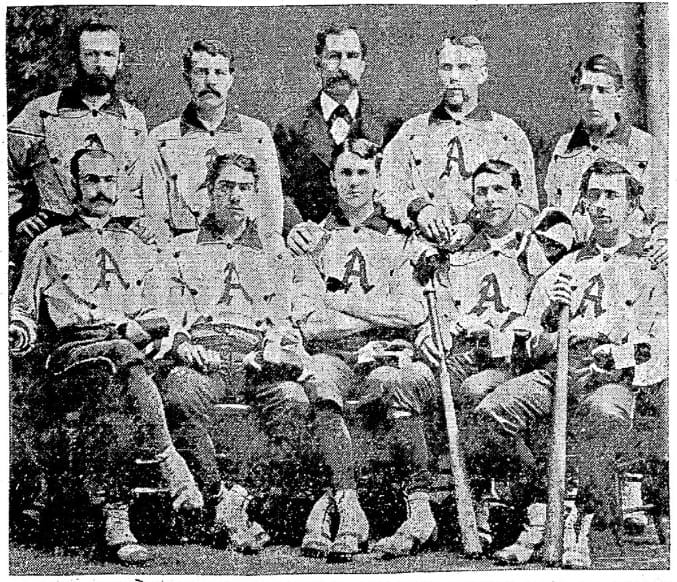
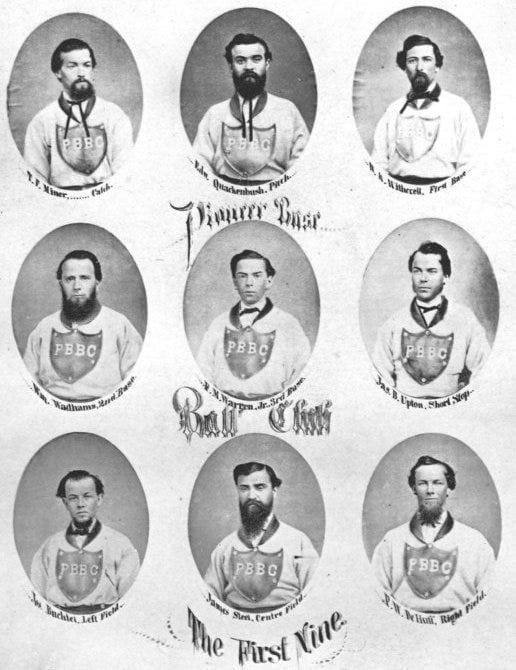
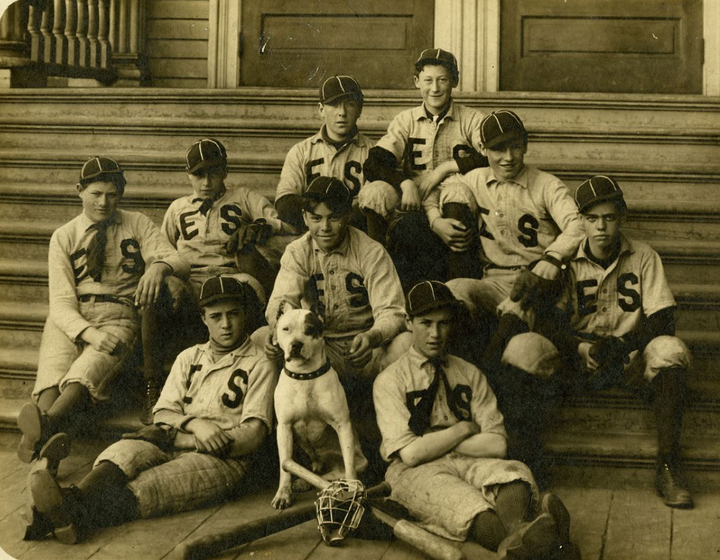
Comments ()